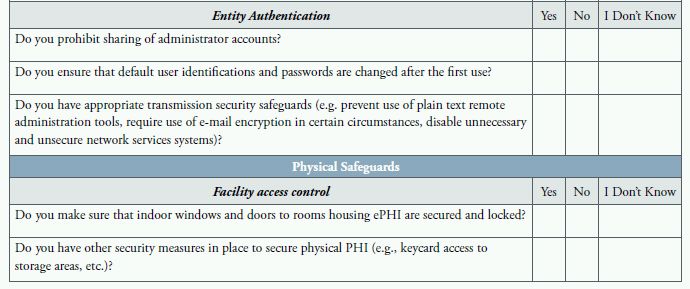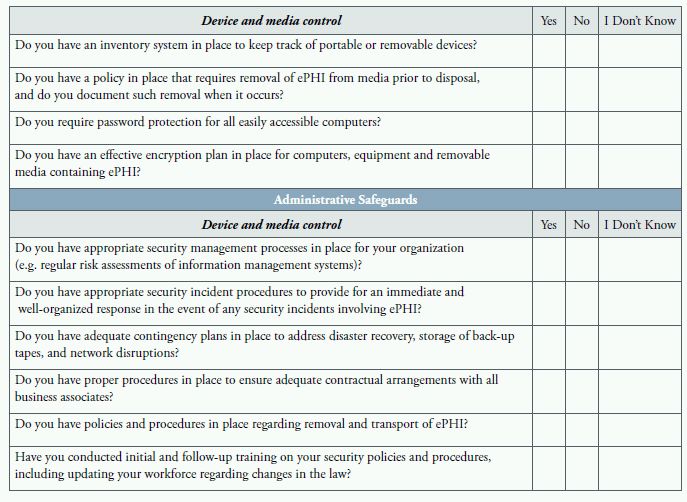On June 10, 2011, the U.S. Department of Health and Human Services' Office for Civil Rights ("OCR") awarded KPMG a $9.2 million contract to develop a pilot HIPAA audit program mandated under the HITECH Act of 2009 to ensure compliance with the HIPAA Privacy and Security Rules and Breach Notification standards.
Between November 2011 and December 2012, the OCR will audit up to 150 covered entities.
WHAT IS MY RISK?
OCR has made clear that enforcement actions may follow audits revealing significant HIPAA Security compliance issues. In recent years, OCR has stepped up its enforcement activity:
- Massachusetts General Hospital. $1 million settlement and three-year Corrective Action Plan for loss of Protected Health Information ("PHI") by employee. (February, 2011)
- Cignet Health. $4.3 million penalty for refusing patients access to their medical records. (February, 2011)
- UCLA Health System. $865,000 settlement and three-year Corrective Action Plan for allowing unauthorized access to patient medical records. (July, 2011)
WILL MY ORGANIZATION BE NEXT?
The initial HIPAA audit program is focused on HIPAA-covered entities (i.e. health care providers, health plans and health care clearinghouses). With 150 audits planned and an aggressive timeline, covered entities should not be surprised to receive an audit request.
WHEN WILL THE AUDITS BEGIN?

HOW LONG DOES THE AUDIT TAKE?

WHAT WILL THE ON-SITE VISIT LOOK LIKE?
- Interviews with key organizational leaders;
- Scrutiny of physical operations controls (i.e. storage, maintenance and use of PHI);
- Assessment of how well organizational policies and procedures meant to protect PHI are implemented in practice by the organization;
- Identification of areas of concern with respect to general regulatory compliance.
WHAT WILL THE AUDITORS FOCUS ON?
OCR has not yet released a set of audit questions. In May 2011, however, the HHS Office of Inspector General ("HHS-OIG") issued a report based on the agency's audits of seven hospitals across the country. The report identified a number of vulnerabilities, which are likely to be high on OCR's list of priorities. Areas of vulnerability included:
- Inadequate security of wireless networks
- Lack of adequate updates to software and operating systems
- Access log recordkeeping
- Insufficient incident detection and response procedures
- Inadequate user access controls and password management controls
- Risk of theft or loss of mobile devices
- Information access management, including role-based access
The "HHS-OIG" report also placed particular emphasis on so-called "high impact" vulnerabilities. The vast majority of high impact vulnerabilities related to lacking or insufficient technical safeguards (i.e. insufficient wireless access control, audit control, integrity control, and person or entity authentication and transmission security). We expect that OCR auditors will focus attention on these high impact vulnerabilities.
HOW SHOULD MY ORGANIZATION PREPARE?
The HHS-OIG report provides a good starting point for identifying vulnerabilities that may be the focus of the OCR audits. Developing a work plan and reviewing your operations in light of the vulnerabilities identified in the report may help reduce the risks of adverse findings in an audit. To help you in this effort, our Health Care Privacy and Data Security attorneys have developed the attached checklist.
Your preparation should also include:
- A review of your policies and procedures to ensure compliance with the HIPAA Security Rule;
- A review and update as necessary of your organization's risk assessment plan;
- Updates to your privacy and security safeguards and implemention of corrective actions when necessary;
- Updating of your training and workforce education materials as necessary.
By December 2012, the U.S. Department of Health and Human Services' Office for Civil Rights (OCR) plans to audit up to 150 covered entities. To help you and your organization prepare, our Health Care Privacy and Data Security attorneys have developed the following checklist.
If you answer "No" or "I Don't Know" to one or more of these questions, we encourage you to contact us to help your organization conduct a thorough assessment.




HOW WE CAN HELP
We know more than just the law – we know the health care industry, health care operations, and health care information systems. Our advice and solutions to privacy, security, and data breach issues address practical, operational and business concerns. We do not provide advice in a vacuum; we seek to solve data privacy and security matters in a way that meets our clients' business needs. We can help your organization identify and assess organizational risk related to the HIPAA Security Rule and OCR audit program. We have assisted covered entities in responding to HIPAA security rule audits and enforcement actions, and we have developed corrective action programs. More generally, our attorneys have extensive experience advising a broad range of health care clients in connection with data privacy and security matters, including compliance with the HIPAA Privacy and Security Rules and the HITECH Act. We advise both covered entities and business associates with respect to the permitted uses and disclosure of protected patient information, billing and payment issues, transaction related issues and the development of policies and procedures for HIPAA and HITECH privacy and security compliance. We also assist clients with the conduct of risk assessments and gap analyses, training of workforces, remediation of known HIPAA compliance matters, and prevention of data disclosure breaches. We have worked closely with clients in connection with responding to state and federal regulatory authorities in the wake of data breaches, including compliance with state and federal reporting and notification obligations, responding to audits and investigations by regulatory authorities, implementation of remedial changes to privacy and security compliance, and employee training and employee discipline related to data privacy and security matters.
The content of this article is intended to provide a general guide to the subject matter. Specialist advice should be sought about your specific circumstances.



